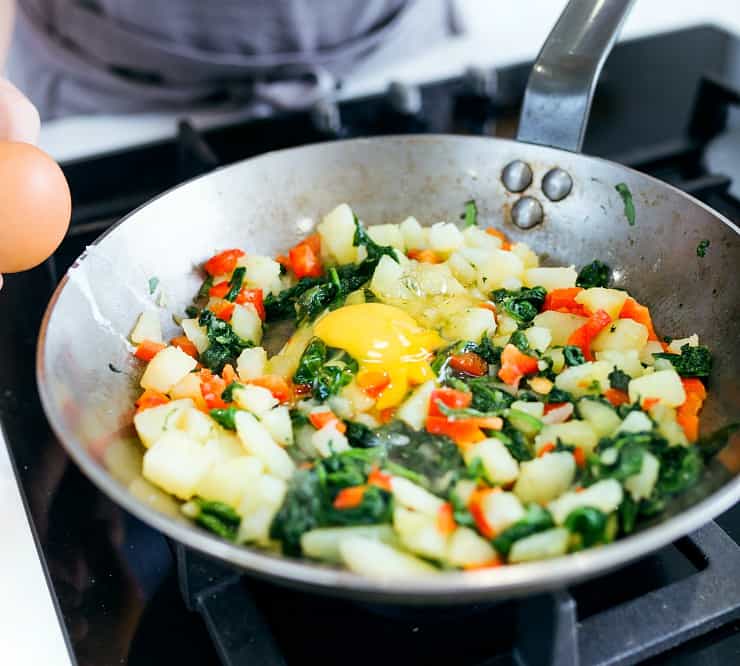Specific foods, supplements, and lifestyle tips to help you boost fertility naturally. Includes practical tips for women and men, including some lesser known factors your doctor may not have discussed with you.
Note from Dena: This post was written by Karina Medina, Dietetic Intern, as part of a research partnership between Back To The Book Nutrition and post-graduate nutrition students from the University of Houston.
You are probably reading this because you already tried different ways to conceive or know of someone who is struggling with infertility. In Part 1, we discussed the contributing factors to infertility.
Whatever the reason may be, boosting your fertility naturally can be less painful, cost savvy, and healthier in the long run. Ideally, begin these efforts at least six months prior to trying to get pregnant.
9 ways to boost fertility naturally
1. Eat a Healthy, Real Food Diet
A diet lacking in essential nutrients considerably compromises fertility.
A great way to start is by following a diet that includes a proper amount of carbohydrates, protein, fiber, and essential fats to support hormone balance and improved fertility. (12)
Here are a few tips:
- Eat mostly plants – A plant rich, Mediterranean style diet has been shown to improve fertility. (6)
- Eat healthy carbs– This includes whole fruits, a variety of brightly colored vegetables, and healthy grains.
- If you are overweight and have PCOS, consider lower carb or a closely monitored ketogenic diet with carb cycling – Studies are promising in these cases, but discuss with your provider first as these may not be supportive of fertility in everyone. (16)
- Increase fiber – Fiber helps remove toxins and excess hormones from the body, and helps balance blood sugar.
- Avoid or limit high processed foods, especially trans fats – Trans fats have been shown to lower fertility. They’re are found in restaurant and fast foods, and are indicated by the words “hydrogenated”, “partially hydrogenated”, or “interesterified” on the ingredient list of food packages.
- Increase omega-3 fatty acids – These can regulate ovulation and promote fertilization and implantation. (1,2) Wild caught fish and seafood are the best sources of omega-3s.
- Choose organic, whole milk dairy products from animals raised on pasture – Whole milk dairy contains healthy fats that help promote ovulation and production of healthy eggs. (1,3) In cases of estrogen excess, dairy may need to be reduced or eliminated for a time.
- Eat meats raised on pasture rather than conventional meats and rotate red meats with other protein sources – Pasture raised poultry and eggs, wild caught fish and seafood, nuts, beans and lentils are all good options. (6)
- Eat healthy fats – Examples include avocados, eggs from hens raised on pasture, nuts, seeds, olive oil, wild caught fatty fish, and fats from animals raised on pasture. Lower fat diets have been linked to infertility. (12)
- Drink water – Avoid sugary drinks or concentrated juices.
- Limit or avoid caffeine – Caffeine may contribute to hormonal imbalance; it’s effects on fertility are unclear. (2)
- Limit or avoid alcohol – Frequent alcohol intake can contribute to ovulation disorders and conditions of estrogen excess such as endometriosis and fibroids, and can reduce fertility. Aim for no more than 1-2 drinks per week.
2. Maintain a Healthy Weight
Although weight loss in obese individuals has been shown to increase pregnancy rates, weight loss using fad diets is hardly effective. The reverse is also true, being underweight also decreases our chances to conceive. What is the key then? Maintaining a healthy weight and eating a nutrient rich, whole foods diet.
Please consider that while a healthy weight is recommended, being a few pounds over or under your ‘ideal’ weight does not necessarily affect your fertility. However, being severely undernourished or obese may result in hormonal imbalances, which could lead to problems when trying to conceive. (13)
3. Correct Low Progesterone
Progesterone plays a very important role in conception by maintaining the lining of the uterus and helping the fertilized egg to attach.
Not surprisingly, low progesterone has also been linked to infertility and miscarriage. If your provider has confirmed you have insufficient progesterone, learn more about root causes and follow these tips to help raise it naturally.
Ways to Boost Progesterone (5)
- Reduce stress – Chronic stress increases cortisol and can deplete progesterone. To reduce stress, practice activities such as deep breathing, relaxation techniques, or a walk.
- Get great sleep – Getting less than 7 hours of sleep each night can affect cortisol and progesterone levels.
- Increase intake of Zinc, Magnesium, vitamin B6 and vitamin C – Examples of foods high in zinc are lamb, beef, oysters, egg yolk, oats, pecans, and pumpkin seeds. Magnesium-rich foods are dark green vegetables, almonds, legumes, brown rice, avocado, and cashews. Foods containing vitamin B6 are fish, organ meats, and bananas. Vitamin C rich foods are citrus fruits, strawberries and tomatoes.
- Increase cholesterol from pasture raised animal foods – Cholesterol synthesizes pregnenolone, a hormone that helps in the production of progesterone. You can eat foods like olive oil, nuts, seeds and avocado.
- Consider herbal supplements – Some herbs naturally promote the balance of hormones by increasing progesterone. These include: chasteberry (or Vitex) and adaptogenic herbs like maca.
- Correct hypothyroidism – Low thyroid function can lead to low progesterone
- Correct estrogen excess – too much estrogen can lead to low progesterone. Reducing BPAs in plastic and other chemicals that act like estrogen in the body, as well as eating cruciferous vegetables daily, adding fresh herbs and spices to your cooking, and ensuring daily bowel movements can all be helpful for lowering estrogen. Get more tips to lower estrogen here!
4. Optimize your vaginal and gut microbiome
An imbalanced vaginal and gut microbiome results in conditions such as Bacterial Vaginosis and other infections that affect a woman’s ability to conceive and may also increase risk for miscarriage.
Here are a few tips to optimize vaginal and gut microbiome (6,10):
- Eat a healthy diet as outlined above
- Eat fermented foods daily and/or take a probiotics supplement
- Reduce Stress
- Exercise, but don’t overdo it
Note from Dena:
If you’ve done all of the above and still deal with chronic gut or vaginal infections, consider working with a holistic or functional medicine practitioner to order a comprehensive stool test to identify and address specific imbalances at the root of these infections. Schedule a free call to learn more about my Holistic Nutrition Coaching and testing services.
5. Take a Fish Oil or Cod Liver Oil Supplement
Omega-3 fatty acids reduce inflammation and help balance hormone levels. (7,12) When considering increasing omega-3 fatty acids, it is important to know the difference between the two types, DHA (docosahexaenoic acid) and EPA (Eicosapentaenoic acid). When it comes to increasing the chances to conceive, EPA is more beneficial so choose a blend with a high ratio of EPA to DHA.
6. Correct Micronutrient Deficiencies
A wide array of vitamins and minerals can be obtained from a healthy diet. Still, deficiencies of these micronutrients can exist, compromising fertility.
Consider taking a high-quality multivitamin and discuss with your provider whether you need to add supplements of individual nutrients. (2,12)
Important Vitamins & Minerals for Fertility (2, 12,15):
- Vitamin D – from sunlight as well as foods like wild caught fatty fish, cod liver oil, and eggs from hens raised on pasture
- Vitamin C – found in berries, bell peppers, kiwi, broccoli, and kale
- Vitamin E – found in almonds, sunflower seeds, avocado, and spinach
- Folate and other B vitamins – found in leafy green vegetables, whole grains, meats, organ meats, and eggs from animals raised on pasture
- Zinc – found in wild caught shellfish, meats raised on pasture, pumpkin seeds, and chickpeas
- Selenium – found in Brazil nuts, wild caught fish, and sea vegetables like seaweed
Note from Dena:
I recommend that all women planning to get pregnant have a Micronutrient Test done to identify the specific nutrients with which they need to supplement. Schedule a free call to learn more about getting tested.
7. Minimize exposure to toxic chemicals
Chemicals are unavoidable in modern society, but here are a few tips to minimize exposure to chemicals that disrupt hormones and compromise fertility.
- Wash produce and buy organic products when possible. Limit the intake of processed foods (2)
- Drink filtered water – I like reverse osmosis filters that remove viruses, bacteria, plastics, drug remnant, fluoride, chlorine, and other harmful chemicals.
- Drink from glass or stainless containers instead of plastic.
- Minimize use of plastics, even BPA free versions.
- Use stainless, cast iron, enamel, and glass for cooking rather than nonstick pots and pans.
- Limit exposure to household chemicals by buying nontoxic products.
- Choose safer makeup and personal care products free of parabens, phthalates and other harmful chemicals.
DOWNLOAD A LIST OF MY FAVORITE NATURAL SKIN CARE AND CLEANING PRODUCTS HERE!
8. Reduce stress
Pregnancy is more likely to occur when couples feel happy and relaxed. When stress levels are high, pregnancy rates drop by 29%. (2,12)
Tips to reduce stress:
- Get a massage
- Take a walk
- Go dancing
- Develop a daily prayer/meditation practice
- Spend time in nature
- Do gentle stretching exercises
- Read a book
- Correct physical stressors like infections, inflammation, blood sugar imbalances, etc.
DOWNLOAD MY 3 STEP GUIDE TO STRESS MANAGEMENT HERE!
9. Exercise, but don’t overdo it
Exercise is recommended for couples who are trying to conceive. Too much exercise or exercise that is too intense, however, can disrupt the ovulation cycle for women and cause a low sperm count for men. (4) You should be able to recover your energy quickly (within an hour) after a workout – if it takes hours to recover, you may be doing too much.
How to Boost Male Fertility Naturally
Female infertility has often been the center of attention but in some cases addressing male fertility can make a difference. Increasing sperm count can be an effective solution and there are natural ways to do so.
The following recommendations are intended to improve sperm health (5,8,14,15):
- Increase anti-oxidants like C,E, and CoQ10 found in fruits, vegetables, nuts, seeds, wild caught fatty fish, and animal products raised on pasture; consider antioxidant supplements
- Eat more wild caught fish and seafood for omega-3 fatty acids and minerals like magnesium, zinc, and selenium
- Limit processed meats and conventionally raised meats (studies have not yet compared the effects of meats raised on pasture to conventionally raised meats)
- Eat sperm-friendly foods (e.g. citrus fruits, dark chocolate, broccoli, bananas, garlic, ginseng, etc.)
- Increase vitamin D intake through foods (e.g., fatty fish, egg yolks from hens raised on pasture, and cheese from animals raised on pasture), supplements, and/or safe sun exposure
- Lose weight if you’re overweight
- Reduce stress
- Get regular exercise, but don’t overdo it
- Avoid smoking
- Limit alcohol consumption
About the Author
Karina Medina is originally from Mexico and completed her B.S. in Human Nutrition and Foods at the University of Houston, where she is currently completing her dietetic internship. She is passionate about nutrition and disease prevention and would like to specialize in Pediatric Nutrition to help new generations love and respect their bodies by living healthier lifestyles.
Disclaimer: Information on this site is intended only for informational purposes and is not a substitute for medical advice. Always consult with a trusted healthcare provider before implementing significant dietary change. Read additional disclaimer info here.
1. American Pregnancy Association. “How to Get Pregnant Naturally.” http://americanpregnancy.org/naturally/get-pregnant-naturally/
2. Axe, J. “Natural Infertility Treatment and Home Remedies.” https://draxe.com/natural-infertility-treatment-remedies/
3. Baker, D. (2018) “Is Milk Good for Fertility?” https://www.naturalfertilityandwellness.com/is-milk-good-for-fertility
4. Baker, D. (2018). “4 Tips to Enhance Fertility Through Exercise”. https://www.naturalfertilityandwellness.com/exercise-for-fertility/
5. Brighten, J. “9 Ways to Boost Progesterone & Your Fertility”. https://drbrighten.com/boost-low-progesterone/
6. Ghandi, B. (2017). “Here’s Exactly What to Eat (And Not Eat) To Maximize Fertility”. https://www.mindbodygreen.com/articles/how-to-eat-for-the-healthier-reproductive- system
7. Howland, G. (2018). “Fertility Diet: Nutrition to Conceive Naturally”. https://www.mamanatural.com/fertility-diet/
8. Huizen, J. (2017). “What are the Best Ways to Increase Sperm Count?”. https://www.medicalnewstoday.com/articles/320010.php
9. (removed)
10. Pescow, R. “Fertility and the Microbiome: How Probiotics Can Help You Conceive”. https://www.hyperbiotics.com/blogs/recent-articles/fertility-and-the-microbiome-how-probiotics-can-help-you-conceive
12. Wells, K. (2018). “How to Reverse Infertility & Get Pregnant Naturally.” https://wellnessmama.com/1326/get-pregnant-naturally/
13. WebMD. (2017). How Do Exercise, Weight and Age Affect Fertility? https://www.webmd.com/infertility-and-reproduction/guide/infertility-age-weight-exercise
14. Afeiche, M.C., et al. “Processed Meat Intake is Unfavorably and Fish Intake Favorably Associated with Semen Quality: Indicators among men attending a fertility clinic.” J Nutr. 2014 Jul; 144(7): 1091–1098. https://www.ncbi.nlm.nih.gov/pmc/articles/PMC4056648/
15. Collins, G.G. and Rossi, B.V. “The impact of lifestyle modifications, diet, and vitamin supplementation on natural fertility.” Fertility Research and Practice 2015;1:11. https://fertilityresearchandpractice.biomedcentral.com/articles/10.1186/s40738-015-0003-4
16. McGrice, M. and Porter, J. The Effect of Low Carbohydrate Diets on Fertility Hormones and Outcomes in Overweight and Obese Women: A Systematic Review. Nutrients. 2017 Mar; 9(3): 204. https://www.ncbi.nlm.nih.gov/pmc/articles/PMC5372867/





Fertility has been a major cause of concern for many couples nowadays! I am glad that you have addressed the issue holistically and i shall take care of my diet from now on! Thanks for writing an informative blog post!
These are wonderful tips. So many ways to keep healthy for better fertility.
This would be so helpful to those who are trying to conceive. Thank you for putting this up.
the post seams very useful to me. You have everything in one place and totally balanced. thank you for that!
You’re welcome. Thanks for your kind feedback!
These are great tips in boosting fertility!! Some of these actually worked for my hubby and I.
That’s great, Ashley. Thanks for sharing!
This is interesting! I myself cannot conceive as I am a guy, but this does seem helpful for those who need to!
Ha, then I need to NOT do these things! Thanks for sharing!
Thank you for sharing these tips. I definately needed to see these today.
You’re welcome!
Very informative and helpful tips. Perfect timing for me to read this article as my friends asking me about this thing yesterday. I will share this with them immediately, thanks for sharing!
Great – I hope it helps them!
This was new to me. Thanks for making us aware of it.
You’re welcome – thanks for your comment.